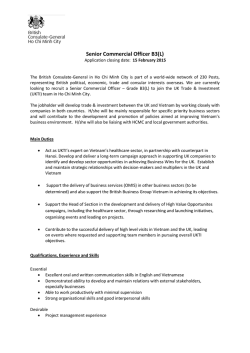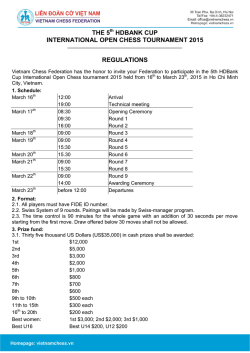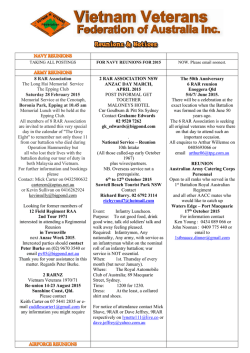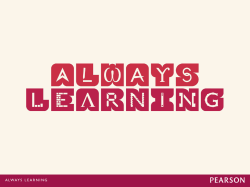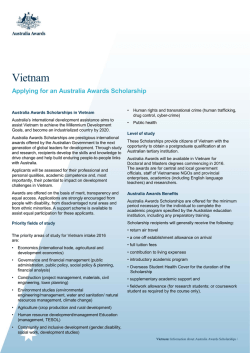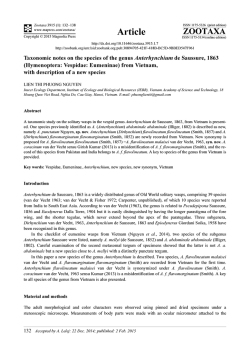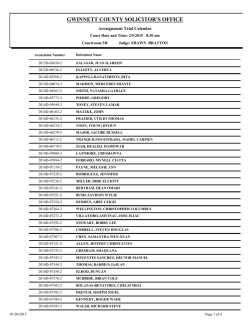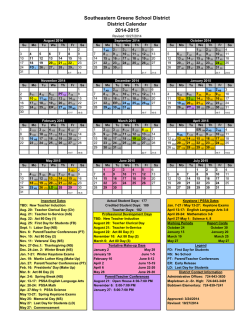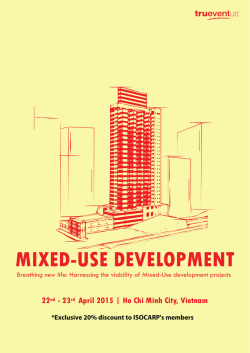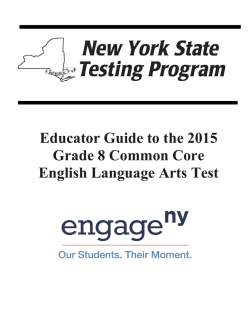
KOREA AND VIETNAM HOW STATES ARE
KOREA AND VIETNAM HOW STATES ARE MADE AND UNMADE History 295-05, Spring 2015 T, Th, 2:15-3:35PM, Mears 217 Matthew D. Johnson [email protected] Mears Cottage 318 Office hours: by appointment T-F, 4:15-5:00pm (alternate arrangements possible) Course Description Focuses on colonialism, war, revolution, state-making, and post-colonial nationalism in two East Asian countries. Both Korea and Vietnam have experienced wrenching transitions in their respective histories--transitions which provide us with important lessons concerning the legacies of Confucian, colonial, and authoritarian rule. This course will attempt to answer the questions of how, despite these shared legacies, the contemporary states of North Korea, South Korea, and Vietnam are so different today, as well as why post-colonial unification efforts have failed or succeeded. **NOTE: THIS COURSE IS READING- AND WRITING-INTENSIVE** Themes: - Regional focus on NE Asia (Korea) and SE Asia (Vietnam) - Experiences and structures of colonial rule - Colonialism and economic change - War and revolution - Post-colonial societies: state-society and economic relations - Creating and deploying wartime memories - Security, regionalization, and spheres of influence Course Goals, Structure, and Requirements Much of our class time will be devoted to discussion of sources and scholarly texts. For this reason, it is expected and required that you will come to each class having read the assigned texts, that you will have addressed (in your thinking, and in your notes) the pre-circulated questions which are intended to guide you in your approach to those texts, and that you will participate actively and regularly in class discussions. Preparing for discussion involves extrapolating larger implications from the readings and grappling with their significance. To that end, you should bring these questions to each day’s readings: How do the texts for the day relate to one another and to the larger themes and other readings in the course? Do these readings reinforce or complicate a particular angle of interpretation? What overlaps or discrepancies emerge when you hold up these texts next to each other? What kind of story do they tell about continuity and change over time? **NOTE 2: IN ADDITION TO THE TEXTS DESCRIBED ON THE SYLLABUS, WE WILL BE REGULARLY ADDING ADDITIONAL AND REQUIRED PRIMARY SOURCES, SCHOLARLY TEXTS, AND OTHER MATERIALS THROUGHOUT THE COURSE OF THE TERM** You must cite evidence, both in discussion and in your written work. In the context of discussion, “citation” refers to specific details and, ideally, texts and page numbers. In the context of your written work citation means either MLA (http://owl.english.purdue.edu/owl/resource/747/01/) or Chicago (http://www.chicagomanualofstyle.org/tools_citationguide.html) style. Finally, while the content goal of this course concerns East Asian history, there is also an important set of process goals which are intended to build your general skills in the following areas: Writing and revision -- that is, writing as a process. Effective reading which allows you to engage constructively and critically with existing interpretations in a scholarly field. Library- and technology-aided research. Approaching knowledge from both positivist (“what do we know through observation?”) and critical (“how might we be wrong?”) perspectives. Understanding and testing of big themes, often derived from social science and historiographical literature (e.g. war and state making, ideology vs. realism, etc.), within a specific global and/or historical context. Course Texts These required texts are available at the college bookstore. Additional readings will be made available online via course emails which will include embedded links and attached documents. It is a requirement of this course that you will have in-class access to all texts assigned for each session. Alice Lyman Miller and Richard Wich, Becoming Asia: Change and Continuity in East Asian International Relations since World War II (Stanford 2011) Sheila Miyoshi Jager, Brothers at War: The Unending Conflict in Korea (Norton, 2014) Mark Lawrence, The Vietnam War: An International History in Documents (Oxford, 2014). Lien-Hang T. Nguyen, Hanoi's War: An International History of the War for Peace in Vietnam (UNC, 2012) **NOTE 3: IN ADDITION, A REGULAR AND PREDICTABLE ELEMENT OF THIS COURSE WILL BE A FRIDAY EMAIL FROM ME PREVIEWING THE WEEK AHEAD, INCLUDING ADDITIONAL READINGS AND RESOURCES (SEE NOTE 2), READING AND DISCUSSION QUESTIONS, DESCRIPTIONS OF IN- CLASS ACTIVITIES, AND FURTHER NOTES CONCERNING EXPECTIONS** Questions to Ask of Course Readings I. For primary sources (texts produced during the period under investigation, i.e. pieces of the historical record): 1) What was the writer’s intent in creating that text? 2) Who or what is the subject of the piece? Whom does the author claim to represent or speak for? 3) Who was the intended audience? How does the author attempt to connect with that audience? 4) What kind of story is the author trying to tell, and how does he/she structure that narrative? What argument does the author seek to advance? Which passage best exemplifies the underlying point of the piece? 5) What rationale or evidence does the author employ to make his/her case? Which elements of the story are factual, and which are subject to interpretation? 6) What was the larger historical context in which the author was working? 7) What kind of background or bias shaped the author’s message? (NOTE: if any of above questions cannot be answered by the text itself, or if any textual references are unclear, do a little digging!) II. For secondary sources (historians’ analyses of the past): 1) What question is the writer posing? 2) How does the author answer that question? Which sentence(s) best state the writer’s overall argument? 3) What other interpretation(s) does the author appear to be arguing against? 4) How does the author develop the argument throughout the piece? What are the subarguments that bolster the main argument? What kind of story is the author trying to tell? 5) How does the author use evidence to prove the argument? (Note: you need to read footnotes in order to answer that question!) You may be called upon to provide answers to any/all questions that apply on a given day, and to support your answers with specific points in the text. Assignments and Grading Paper 1: State Making, War, and Decolonization – 10% Paper 2: Cold War Security Frameworks – 15% Paper 3: Comparing States – North Korea, South Korea, and Vietnam – 15% Research Contribution: collaborative final project – 10% Research Bibliography: final version – 15% Class participation (including preparation for activities and workshops, **daily reading summaries, presentations, and participation in discussion) – 35% A significant requirement of course is active and informed participation in classroom discussions. In general, I’ll be looking for evidence that you’ve done the reading, that you’re thinking about the themes and issues covered by the class, and that you’re making a good-faith effort to improve the classroom experience for everyone enrolled in the course. Remember that there are many ways to make useful contributions: the simplest way is to answer one of my questions or to bring up a detail from the readings, but participation also involves responding to your classmates, making connections between the day’s readings and earlier discussions, synthesizing comments made by classmates, and asking questions of the class, the professor, or both. Using specific passages in the text to support your ideas will be a key part of your participation grade as well. Over the course of the semester, I’ll encourage everyone to participate in different ways, both to recall details, anecdotes, and ideas from the readings and to analyze our course materials in light of the themes of the course and the results of our discussions. I will also be assigning periodic ungraded, but mandatory, homework the completion of which will also contribute to your participation grade. I do not have an ironclad rule about how often each student needs to speak in class: you should generally average at least one comment or question per class period, but I understand that some of you will always be more reserved than others and that everyone has days when they’re less likely to participate. My main advice, then, is that you come speak to me if you’re concerned about your level of participation or want advice on how to get more involved in class, and that you remember that the thoughtfulness of your classroom comments is more important than the frequency with which you speak. Remember that class participation depends on attendance. I’ll be keeping track of attendance throughout the semester; if you miss class once or twice, that won’t affect your performance in the class, but if you have more than two unexcused absences, your participation grade will go down. A final note: If you have any concerns about your grade, please contact me. Likewise, I will do my utmost to help you to improve your performance in the class, particularly if you are encountering challenges in meeting the requirements. **NOTE 4: WE WILL WORKSHOP AND PEER REVIEW THESIS STATEMENTS, PAPER OUTLINES, AND OTHER INSTRUCTOR-ASSIGNED WORK, AND ENGAGED PARTICIPATION IN THESE ACTIVITIES WILL BE AN EXPECTATION OF ALL ENROLLED STUDENTS** Accommodations and Academic Honesty Grinnell College makes reasonable accommodations for students with documented disabilities. Students need to provide documentation identifying any special needs to the Dean for Student Academic Support and Advising, Joyce Stern, whose office is located on the third floor of the Rosenfield Center. Students should then notify me within the first few days of class. Students should also be aware of Grinnell’s policy on academic honesty. Plagiarism, it goes without saying, will not be tolerated in this course Further Notes on Course Design and Curriculum Goals - It is also the goal of the course that we will, together, build a successful learning community within our classroom. A successful learning community is one that is positive, fosters engagement, is safe, and promotes risk-taking (http://www.sequimschools.wednet.edu/domain/781). - “What will habit not do to [every one of us]?” – F. Dostoevsky - Our classroom is a living system. This means: o Shared leadership (http://works.bepress.com/elizabeth_turesky/6/) o That the classroom strives to be a model for a successful organization or team (http://positiveorgs.bus.umich.edu/wpcontent/uploads/merged_document1.pdf) o Inescapable dynamism. Content is only one of the classroom’s several features, the others being (at minimum) student, teacher, and context (http://www.theclassroomsystem.org/System/). o Like all organizations, the classroom is located within other social and environmental systems which, like knowledge, change ceaselessly and in relationship to one another. - This course is consciously – that is to say, by design – a work in process. Students are co-creators of knowledge both in the sense that student preparation and discussion are an essential, but also unpredictable, classroom component, and that the instructor’s week-to-week choices concerning elements of class format, supplementary required readings, and collaborative activities are meant to respond to student (individual, collective) feedback and needs. - Using technology to teach: new connections, deeper engagement, rapid feedback, multiple perspectives, **more time. (http://researchnetwork.pearson.com/elearning/teaching-in-a-digital-age). - The architecture of information, and therefore the context of our research, has changed radically in the past decade [c.a. 2005-2015, since the advent of Google?]. Learning communities that do not adapt to this new research reality will face significant, and most likely insurmountable, challenges to credibility. - Complexity/risk we research every day (http://firstmonday.org/article/view/3484/2857). - The metacognitive tasks (e.g. interpretation, analysis, organization, persuasion) around which even the best higher educations are organized can only take students so far, particularly in the current information age. o Performing advanced functions on inert or created-by-rote data restriction of learning outcomes. o Not “instead of,” but “in addition to.” o Metacognition and the research process: research as learning conversation among researchers who may never meet (http://www.ccsenet.org/journal/index.php/ass/article/download/40848/22580). o Online research: mapping, intelligence, intuition knowing how to know, knowing what is valuable. - o Thinking relationally as well as hermeneutically. (What’s important? To whom?) o In a competitive knowledge economy, value = innovation via arbitrage of information asymmetries, **visible** distinction. o Time compression need for new communicative formats. The interpretive future is now: Digital humanities: digitization plus visualization? Big data: the predictive wisdom of crowds? [Shades of the post-war world; beware GIGO.] **NOTE 5: IN EVERYDAY CLASS MEETINGS AND DURING THE SEMESTER-END COLLABORATIVE RESEARCH PROCESS, YOU WILL BE WORKING CLOSELY WITH CLASSMATES ON SHARED ENDEAVORS – YOUR PREPARATION AND LEADERSHIP WILL HAVE A POSITIVE IMPACT ON OUTCOMES FOR OTHERS IN THE COURSE, SO PLEASE PLAN ACCORDINGLY** KOREA AND VIETNAM HOW STATES ARE MADE AND UNMADE Spring 2015 Matthew D. Johnson Schedule of Meetings and Assignments UNIT ONE: THE STATE – COLD WAR PERSPECTIVES WEEK ONE Meeting One, Jan. 20 - Introductions; Course overview and expectations https://www.youtube.com/watch?v=tLJKVVtiR3g https://www.youtube.com/watch?v=BwYyo-8Ou1w x https://www.youtube.com/watch?v=p97xgU6qO3s x https://www.youtube.com/watch?v=o_9nZBWJ4z8 x https://www.youtube.com/watch?v=w8dBQchmJE8 Meeting Two, Jan. 22 - Miller and Wich, Becoming Asia, “Introduction,” “Planning the Postwar World,” and “The Chinese Civil War” https://commons.wikimedia.org/wiki/Category:Maps_of_Chinese_Civil_War#mediaviewer/File: Situation_at_the_End_of_World_War_Two.PNG http://www.foreignaffairs.com/articles/23331/x/the-sources-of-soviet-conduct http://www.wyzant.com/resources/lessons/history/hpol/churchill/peace http://www.learner.org/workshops/primarysources/coldwar/docs/lippman.html **ACTIVITY: Characteristics of Cold War civil conflicts – China as example WEEK TWO Meeting One, Jan. 27 - Miller and Wich, Becoming Asia, “Japan: Occupation and Recovery,” “The Korean War,” “Decolonization, Nationalism, and Revolution,” and “The U.S. Alliance System” https://www.mtholyoke.edu/acad/intrel/nsc-68/nsc68-1.htm http://www.foia.cia.gov/sites/default/files/document_conversions/44/1950-01-12.pdf http://www.foia.cia.gov/sites/default/files/document_conversions/44/1954-01-08.pdf OPTIONAL: https://www.mtholyoke.edu/acad/intrel/fakiolas.htm OPTIONAL: https://www.mtholyoke.edu/acad/intrel/korpart.htm **ACTIVITY: Idealist and realist views of Cold War foreign relations Meeting Two, Jan. 29 - Miller and Wich, Becoming Asia, The Sino-Soviet Alliance,” The Vietnam War,” “Strategic Realignment,” and “The End of the Cold War” http://www2.gwu.edu/~nsarchiv/NSAEBB/NSAEBB38/document7.pdf **ACTIVITY: Cold War chronologies WEEK THREE Meeting One, Feb. 3 - Miller and Wich, Becoming Asia, “The Rise of China,” “Entering the New Century,” and “Change and Continuity” **ACTIVITY: Thesis statements, papers, and presentations Meeting Two, Feb. 5 **PRESENTATIONS (1), Actors and Interests in Cold War Asia WEEK FOUR **Paper due, Feb. 9: State Making, War, and Decolonization Meeting One, Feb. 10 **PRESENTATIONS (2): Actors and Interests in Cold War Asia UNIT TWO: LOCAL AND GLOBAL CONTEXTS (1) – THE KOREAS Meeting Two, Feb. 12 **ACTIVITIES: Colonial memories online - Korea ; Reading from notes to text WEEK FIVE Meeting One, Feb. 17 - Jager, Brothers at War, “Introduction,” “Liberation and Division,” “Two Koreas,” “Momentous Decisions,” and “War for the South” Meeting Two, Feb. 19 - Jager, Brothers at War, “Uncommon Coalition,” “Crossing the 38th Parallel,” and “An Entirely New War” WEEK SIX Meeting One, Feb. 24 - Jager, Brothers at War, “Quest for Victory,” “The Stalemate,” and “‘Let Them March Till They Die’” Meeting Two, Feb. 26 - Jager, Brothers at War, “Propaganda Wars” and “Armistice, at Last” WEEK SEVEN Meeting One, Mar. 3 - Jager, Brothers at War, “Lessons of Korea,” “Deepening the Revolution,” and “Korea and Vietnam” Meeting Two, Mar. 5 **ACTIVITY: Reviewing Brothers at War WEEK EIGHT **Paper due, Mar. 9: Cold War Security Frameworks Meeting One, Mar. 10 **PRESENTATIONS (1): The militarization of Northeast Asia Meeting Two, Mar. 12 **PRESENTATIONS (2): The militarization of Northeast Asia **SPRING BREAK, MAR. 14-29** UNIT THREE: LOCAL AND GLOBAL CONTEXTS (2) – VIETNAM WEEK NINE Meeting One, Mar. 31 **ACTIVITIES: Colonial memories online - Vietnam; Memorializing the Vietnam War Meeting Two, Apr. 2 - Atwood, The Vietnam War, “Vietnamese Nationalism and Communism” and “Colonial War and Cold War Crisis” WEEK TEN Meeting One, Apr. 7 - Atwood, The Vietnam War, “Between Two Storms” and “The Deepening Crisis” [selections] - Nguyen, Hanoi’s War, “Introduction” and “Le Duan’s Rise to Power and the Road to War” Meeting Two, Apr. 9 - Atwood, The Vietnam War, “Americanization” - Nguyen, Hanoi’s War, “Policing the State in a Time of War” WEEK ELEVEN Meeting One, Apr. 14 - Atwood, The Vietnam War, “The Wider War” and “The Tet Offensive” [selections] - Nguyen, Hanoi’s War, “The Battle in Hanoi for the Tet Offensive” Meeting Two, Apr. 16 - Nguyen, Hanoi’s War, “To Paris and Beyond” and “Sideshows and Main Arenas” WEEK TWELVE Meeting One, Apr. 21 - Atwood, The Vietnam War, “New Departures” - Nguyen, Hanoi’s War, “Talking While Fighting” and “War Against Détente” Meeting Two, Apr. 23 - Atwood, The Vietnam War, “Peace and War” - Nguyen, Hanoi’s War, “War for Peace” UNIT FOUR: WEEK THIRTEEN **Paper due, Apr. 28: Comparing States – North Korea, South Korea, and Vietnam Meeting One, Apr. 28 **GROUP RESEARCH Meeting Two, Apr. 30 **GROUP RESEARCH WEEK FOURTEEN Meeting One, May 5 - Presentations (1): Prospects for war and peace in contemporary East Asia Meeting Two, May 7 - Presentations (2): Prospects for war and peace in contemporary East Asia **EXAM WEEK, MAY 11-15** **No exam, individual annotated research bibliographies due Friday, May 15, 5:00pm.
© Copyright 2026
